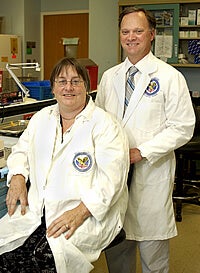
Imagine if you came up with a simple but powerful idea: create a vaccine against the most addictive drugs. It could therapeutically help countless numbers of addicts overcome their substance dependency. Those at high-risk for drug use could be inoculated and avoid an entire destructive lifestyle. Furthermore, anyone genetically screened for a family history of addiction could effectively manage their physiological drives with a shot. What effect would all of this treatment have on society? It might be the very thing to win the “War on Drugs” that has cost American taxpayers over $1 trillion over the last 40 years. An idea like that is the stuff that careers are built on. Dr. Thomas Kosten, who came up with this idea as a student, has spent the last 20 years working with his wife, Therese, who has a Ph.D. in psychology and neuroscience, making this simple idea into a reality. That’s right – a cocaine vaccine has been developed and is currently in a Phase II trial that is set to complete in 2014.
But Drs. Kosten and Kosten have a not-so-simple problem: No pharmaceutical companies in the U.S. will manufacture the vaccine and that means it can’t get FDA approval.
To unravel this story, we have to consider how vaccines work. The human immune system cannot recognize small molecules, such as drugs. These substances basically slip under the radar, which is one reason why they are so effective. But the immune system will recognize larger structures, like free-floating foreign proteins or viruses, and create antibodies that help mark them for destruction.
The strategy then to get small drug molecules to show up on this radar is to chemically bond them to a carrier protein that can trigger antibody production. Dr. Kosten’s approach is to link the cocaine molecule to an inactivated cholera protein and use the cholera bacterium as a vector to introduce the vaccine. The body then produces antibodies against both cholera and cocaine.
As with other addictive substances, the euphoric feelings of cocaine are due to it binding in dopamine receptors in the brain. These receptors are important in the brain’s reward system. While dopamine is the natural way for the brain to experience pleasure, drugs like cocaine bind to the receptors much more strongly, and over time, the natural highs from dopamine just don’t cut it anymore. Hence with repeated use, larger amounts of cocaine are required to experience the same kind of high. Furthermore, the large quantities of dopamine floating around from the action of cocaine can reach toxic levels and kill brain cells.
A cocaine user who has been inoculated with Dr. Kosten’s vaccine, called TA-CD, has antibodies that will bind to cocaine in their bloodstream. Not only is the cocaine captured, the cocaine-antibody complex is too large to pass through the blood-brain barrier. Now the vaccine itself doesn’t remove the craving; it just removes the effectiveness of cocaine at producing the desired result.
So far so good…what’s the problem?

It turns out that during the Phase I clinical trial, which successfully helped some of the volunteers who were inoculated build immunities to cocaine, some still tried to get their fix and that requires having more cocaine in their blood stream than antibodies. Those antibodies are built up after five booster shots and antibodies are around for about three months. Researchers found some of the volunteers had 10 times the amount of cocaine in their blood compared to before, and a few of them admitting that they had gone broke trying to buy more. However, a number of volunteers soon realized that cocaine just wasn’t going to give them the high they wanted anymore and stopped using.
A Phase III trial for the cocaine vaccine cannot proceed unless a company’s supports it. But the dilemma is clear: What would happen if the media got wind that inoculated drug users were buying even more coke than before. It would be a public relations nightmare for any business. Kosten also believes that the pharmaceutical industry lacks a focus on preventative medicine, so they are just not interested in supporting this product. Interestingly, back in 2000, a pharmaceutical company, Cantab Pharmaceuticals, had opted to develop the vaccine, but experienced some drug failures and ultimately was bought out, somehow leaving TA-CD lost in the shuffle. So Dr. Kosten has been looking for a long time to find a company that will step up to make it in the U.S., but to no avail. Kosten admits that he is now considering finding a manufacturer in China.
For anyone who recognizes that the United States has lost the “War on Drugs,” the knowledge that a cocaine vaccine exists but no one will make it is beyond frustrating. According to the National Survey on Drug Use and Health, over 1 million people were identified as cocaine abusers in 2009. Even taking a small dent out of the cocaine user population could have some serious economic impacts.
But what’s really promising is that this vaccination strategy works for other addictive substances too. In fact, Dr. Kosten has developed a nicotine vaccine that is moving into Phase III trials. Other drugs are being looked into as well by other researchers using the same strategy. Beyond that, the dopamine reward system is implicated in a host of other behaviors that may be able to be inoculated against down the road.
TA-CD has time yet to find another home after years of waiting in the wings. As the world waits for someone to make this into a reality, the Kostens will keep trying to think of new groups of addicts that they may be able to vaccinate.
[Images: Alaska Dept. of Safety, BCM]
[Sources: BCM, ClinicalTrials.gov, Culturemap, NIDA, NSDUH, Time, Washington Post]



